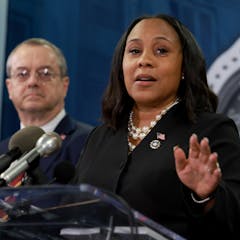
Articles on Reconstruction
Displaying 1 - 20 of 37 articles

A stained-glass window, which shows Jesus as a Black man for the first time, tells a story not only of race but of gender, class and ethnicity.

As Turkey is recovering from the most devastating earthquake in its recent history, a timely opportunity emerges to change how to reconstruct housing.

The first shoe has dropped in the Supreme Court’s process of considering whether Donald Trump is eligible to be president.

A historian and legal scholar of a key part of the US Constitution explains what happens now that the Colorado Supreme Court has ruled Trump cannot be on the state’s presidential ballots.

Colorado’s Supreme Court has removed Donald Trump from the state’s 2024 presidential ballot. A scholar of constitutional law explains why.

Country singer Jason Aldean’s hit song triggered renewed attention on vigilante justice, racism and urban America.

One of the charges against Donald Trump dates back to the 1870s and was designed to give the federal government the power to ensure states held free and fair elections.

A Southerner, Maj. Gen. George H. Thomas was a racist enslaver before the Civil War. But he fought for the Union because he prioritized his oath to defend the Constitution over state interests.

Throughout US history, a ‘white backlash’ has worked to keep Black officeholders and their constituents out of power. Atlanta DA Fani Willis is just the latest.

Known as the military leader who saved America, Ulysses S. Grant left a legacy of fighting for the rights of enslaved people during and after the Civil War.

In a state where elections have turned on Black voters, the recent GOP overhaul of Georgia election laws has many voting rights activists and Democrats concerned that turnout may be affected.

A proposed new airport at Tarras would affect the entire South Island economy. Twelve years on from the Canterbury earthquakes, have the implications of such a project been properly thought through?

The attempt by Donald Trump’s supporters to reverse the 2020 presidential election results shows the need to update the nation’s landmark law for counting presidential votes.

Known as Juneteenth in Texas, Emancipation Days symbolized America’s attempt to free the enslaved across the nation. But those days were unable to prevent new forms of economic slavery.

Concerned about problems in counting Electoral College votes that determine the next president, lawmakers are considering changes to the Electoral Count Act. What is the act, and what’s wrong with it?

Post-war government support saw ex-servicemen head to university by the tens of thousands. Their distinct perspective – and their numbers – shaped 1920s student life

Texas lawmakers resurrected a Jim Crow-era legal maneuver, used to deny Black people the right to vote, in their new law banning most abortions.

Section 3 of the 14th Amendment was first used against Confederate leaders after the Civil War to expel seditionist politicians. Now it could be used against Donald Trump.

A reconstruction of a dinosaur’s back passage reveals it may have been used for visual communication.

The protests that ended in the storming of the US Capitol included members of white supremacy groups, the latest example of such groups being encouraged by politicians to challenge government.
